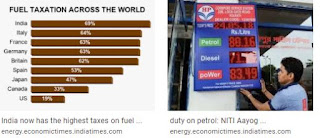Government
and Rising Fuel Prices
No doubt, the economic progress depends upon the money spent by Government and in order to meet the requirements of budget, one of the tool is duties on petrol, diesel, and gas products. In India, the fuel prices increased from time to time. The data states that with the increase in fuel prices, the taxation part in the fuel prices of India, has become maximum in entire world. The Economic Times published the data in newspaper from time to time.
Impact of Rising Fuel Prices
The imposition of
excise duty on petrol, diesel, and gas directly affect the life of common
people. Whenever the crude oil prices are increased in the international
market, the oil marketing companies increase the prices of petrol, diesel and
natural gas. With rise in the prices in petroleum products, the prices of all
things rise and the life of common people affected significantly. The news
reporters, economists, and other experts sometimes look for the solutions to
this problem by reducing the excise duty upon the products. Can Government do
anything to safeguard the people from the heat of rising fuel prices?
Protection
of Environment:
More the use of petroleum prices,
more the pollution will be affecting the life of common people. In order to
protect the environment and set-off the negative affects of climate change,
global warming etc; the government rises the duties and taxes upon petroleum
products. The government can safeguard people from rising fuel prices by
providing the alternate means of transportation and promoting the eco-friendly
vehicles like e-riksha, e-car, e-bus and vehicles based on solar energy.
Controlling
the Fiscal Deficit:
In case, the petroleum products are
being consumed at higher rate of growth; the fiscal deficit will be rising and
affecting the value of rupee. More the consumption of petroleum products, more
the crude will be imported and the rupee will be depreciated. The Government
should reduce the import of crude and it is possible only by encouraging people
to cut the consumption of products based on crude. The Government should run
campaign to reduce the consumption of petroleum products and promote the power
generation through renewable energy sources including bio-mass.
GST on Petroleum Products:
The Chief Economic Advisor K V Subramanian suggested to bring petroleum products under the ambit of the Goods and Services Tax (GST) on 27th February 2021; in order to reduce the food inflation. However, the decision lies with the GST council.








